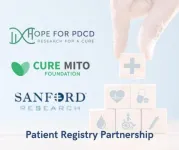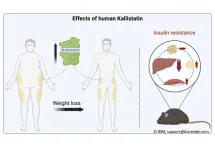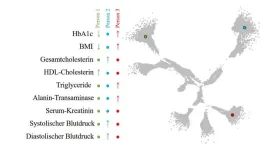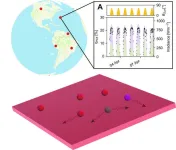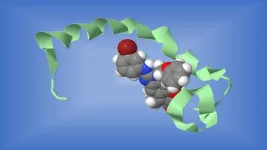(Press-News.org) March 18, 2024 – Cure Mito Foundation and Hope for PDCD foundation, both patient-led foundations focused on advancing research and supporting families affected by Leigh syndrome and Pyruvate Dehydrogenase Complex Deficiency (PDCD), respectively, are excited to announce a launch of a PDCD patient registry. This innovative registry will be led by the Hope for PDCD foundation and hosted on the same registry platform as the well-established Leigh Syndrome patient registry, developed by the Cure Mito Foundation. This strategic move is aimed at enhancing patient convenience and improving data alignment and research effectiveness.
Both Leigh syndrome and PDCD are types of primary mitochondrial diseases mainly affecting children. There is an overlap between two conditions, with around 25-35% of PDCD patients also having Leigh syndrome, according to published literature.
Both registries will be hosted on the Sanford CoRDS registry platform. Sanford CoRDS is the largest, free international rare disease registry. It works to connect participants, advocacy groups and researchers in the field.
By hosting both registries on the same platform, we are reducing the burden on patients and caregivers. Now, individuals affected by either or both conditions can register and answer many questions just once, streamlining their participation in crucial research efforts. This integration not only eases the process for patients and families but also allows for better alignment and comparison of data across different but potentially related conditions. This will help accelerate research and ultimately improve outcomes for patients.
Frances Muenzer Pimentel, founder of the Hope for PDCD foundation and mom to Violet, who has PDCD, said: “Hope for PDCD is thrilled to launch the first ever international and patient initiated registry for PDCD on the CoRDS platform in conjunction with Cure Mito. Launching on CoRDS with Cure Mito allows the 25-35% of PDCD patients that also have a Leigh Syndrome diagnosis to complete both registries on one platform. This registry will become a powerful tool to better understand the disease and to help support the development of treatments and participation in clinical trials. The registry also signals to industry and academia that we are an organized and unified patient population in urgent need of a standard of care and effective treatments.”
"Patient registries are valuable sources of information not only for physicians, researchers, and families, but also for industry partners who are working to better understand the complexities of rare diseases.” explained Sue Clement, Senior Director at Saol Therapeutics, “We are pleased that Hope for PDCD is working with Cure Mito to create a registry with the goal to advance treatments, optimize care, and ultimately improve the lives of those with PDCD."
Sophia Zilber, board member and patient registry director of the Cure Mito Foundation, said, “The concept of merging data from various registries is frequently discussed within the rare disease community. However, this is a complex task that requires a foundational alignment of data collection methods right from the start. Our collaboration is pivotal in facilitating this alignment. Since the inception of our Leigh syndrome patient registry two years ago, we have witnessed remarkable advancements and insights. With this collaborative effort, we are enthusiastic about replicating this success within the PDCD community and across our broader community.”
The unified registry platform will facilitate deeper insights into PDCD and Leigh Syndrome, potentially unveiling commonalities that could lead to more effective treatments. It also opens avenues for patients to participate in a broader range of studies and trials relevant to their conditions.
Patients and caregivers interested in joining the registry can expect a user-friendly interface, robust data security, and the opportunity to contribute directly to the advancement of medical research. By participating, they become vital partners in the quest to understand and treat these complex diseases.
For more information about the PDCD patient registry, Leigh Syndrome patient registry, or to register, please contact info@curemito.org and info@hopeforpdcd.org.
About Cure Mito Foundation:
Cure Mito Foundation is a parent-led 501(c)(3) nonprofit organization that was founded in 2018 by a group of families determined to fight for their children’s lives. Cure Mito’s mission is to unite the global Leigh syndrome community to accelerate patient-centered research, treatments, and cures. Cure Mito has an international reach with patients from over 35 countries, currently a part of the Leigh syndrome global patient registry that Cure Mito has developed. Cure Mito funds promising research and strengthens and unites the community through such initiatives as its annual Leigh syndrome symposium and informational website AboutLeighSyndrome.com. Cure Mito is a member of Defense Health Research Consortium, COMBINEDBrain, Global Genes Foundation Alliance, Everylife Foundation Community Congress, and Indo US Rare Organization for Rare Diseases. Cure Mito has been rated as a Top-Rated Nonprofit by @GreatNonprofits. For more information please visit: curemito.org or follow Cure Mito on LinkedIn | Twitter | Facebook | Instagram.
About Hope for PDCD foundation:
Hope for PDCD was founded by PDCD patients and parents in 2022 with an urgent mission: to cure a fatal disease known as Pyruvate Dehydrogenase Complex Deficiency. All financial gifts are invested wisely: 100% of every dollar donated goes to research and advocacy efforts for PDCD. Hope for PDCD has quickly grown into a collective of volunteer parent board members, scientific advisors, and industry partners. Hope for PDCD aims to fund a multi-million dollar research project into new therapeutics for PDHA1 mutations, newborn screening, standards of care, the first ever PDCD-specific patient registry, biomarkers and clinical endpoints. Hope for PDCD serves the PDCD patient community by offering a state-by-state clinician directory, free genetic testing, resources on the ketogenic diet and more. Find out more at hopeforpdcd.org
END
Cure Mito Foundation and Hope for PDCD Foundation announce a patient registry collaboration
2024-03-18
ELSE PRESS RELEASES FROM THIS DATE:
Newborn piglets serve as a model for studying influenza
2024-03-18
Although prevention and treatment strategies are available for influenza, they are not sufficient for vulnerable populations such as young children and newborns. In a new study, published in Virology, a multidisciplinary team of researchers have studied newborn piglets to better understand the progression of influenza infections.
The influenza A virus can infect a variety of birds and mammals, including humans and pigs, due to which it is a threat to public health and food security. While it causes mild ...
Kallistatin contributes to the beneficial metabolic effects of weight loss
2024-03-18
After weight loss, people with overweight and obesity express more of the protein Kallistatin* in subcutaneous white adipose tissue. This was demonstrated by researchers from the DZD in a recent study. In addition, Kallistatin improves metabolism and could open up new therapeutic options for people with obesity and type 2 diabetes in future. The results have now been published in Molecular Metabolism.
An increasing number of people are developing type 2 diabetes and obesity. These are highly complex and multifaceted diseases. In order to treat them sustainably, new approaches to therapy are needed. Clinical studies on humans have ...
WashU engineers manage a first: measuring pH in cell condensates
2024-03-18
Scientists trying to understand the physical and chemical properties that govern biomolecular condensates now have a crucial way to measure pH and other emergent properties of these enigmatic, albeit important cellular compartments.
Condensates are communities of proteins and nucleic acids. They lack a membrane and come together and fall apart as needed. The nucleolus is a prominent condensate in cells. It serves vital roles in cellular physiology and is the site of ribosome production.
Ribosomes are the multi-protein ...
Study with innovative insights into the heterogeneity of type 2 diabetes
2024-03-18
A landmark study by the German Diabetes Center (DDZ), published in The Lancet Diabetes & Endocrinology, sheds new light on the heterogeneity of type 2 diabetes. The researchers employed an innovative algorithm to stratify people with type 2 diabetes using routine data and thus visualize the metabolic diversity of diabetes.
Type 2 diabetes is a disease with highly diverse progression pathways. Using an innovative algorithm, a team led by the German Diabetes Center (DDZ) used routinely measured variables to open up new perspectives on the diversity of type 2 diabetes in terms of insulin sensitivity, insulin secretion, ...
Breakthrough in melting point prediction: over 100-year-old physics problem solved by Queen Mary Professor
2024-03-18
A longstanding problem in physics has finally been cracked by Professor Kostya Trachenko of Queen Mary University of London's School of Physical and Chemical Sciences. His research, published in the Physical Review E, unveils a general theory for predicting melting points, a fundamental property whose understanding has baffled scientists for over a century.
For decades, our understanding of the three basic states of matter – solids, liquids, and gases – relied on temperature-pressure phase diagrams. These diagrams depict the conditions under which each state exists, with distinct lines separating them. However, one crucial line, ...
Shining a light on the underpinnings of rare disease impacting children
2024-03-18
A team from the University of Ottawa's Faculty of Medicine has completed an exciting new study that reveals the inner workings of gene mutations that result in an ultra-rare syndrome with fewer than 100 reported cases since its first description in the early 1960s.
The hard-won research discovery may accelerate the development of a treatment for Borjeson-Forssman-Lehmann Syndrome (BFLS), a neurodevelopmental disorder linked to the X chromosome that’s characterized by seizures, intellectual disability, and behavioural ...
Landmark study shows that ‘transcendent’ thinking may grow teens’ brains over time
2024-03-18
Scientists at the USC Rossier School of Education’s Center for Affective Neuroscience, Development, Learning and Education (CANDLE), have shown for the first time that a type of thinking, that has been described for over a century as a developmental milestone of adolescence, may grow teenagers’ brains over time. This kind of thinking, which the study’s authors call “transcendent,” moves beyond reacting to the concrete specifics of social situations to also consider ...
Reimagining the future of solar energy
2024-03-18
Scientists are always on the lookout for ways to make our world a better place, and one area they're focusing on is solar energy. One idea in this area is to make solar cells more efficient by concentrating more solar light onto them. While investigating this recently, a group of scientists at the Cavendish Laboratory and AMOLF (Amsterdam NL) have found that improving solar cells efficiency in this way is harder than we might think but have discovered other avenues by which it might be possible to improve solar energy capture anywhere on the planet.
The researchers ...
Metformin during pregnancy impacts offspring brain development
2024-03-18
With the rise in gestational diabetes and metabolic disorders during pregnancy, metformin is also being prescribed more frequently. Although it is known that the oral antidiabetic agent can cross the placental barrier, the impacts on the brain development of the child are largely unknown. An interdisciplinary research team from the German Institute of Human Nutrition Potsdam-Rehbrücke (DIfE) have now been able to demonstrate in a mouse model that although metformin has positive effects in pregnant animals, it does not in the offspring. The results were published in the specialist ...
Johns Hopkins Medicine-led team develops fluid biomarker for early detection of ALS and FTD
2024-03-18
Two progressively degenerative diseases, amyotrophic lateral sclerosis (ALS, commonly known as Lou Gehrig’s disease) and frontotemporal dementia (FTD, recently in the news with the diagnoses of actor Bruce Willis and talk show host Wendy Williams), are linked by more than the fact that they both damage nerve cells critical to normal functioning — the former affecting nerves in the brain and spinal cord leading to loss of movement, the latter eroding the brain regions controlling personality, behavior and language.
Research studies have repeatedly shown that in patients with ALS or FTD, the function of TAR DNA-binding protein 43, more commonly called TDP-43, ...
